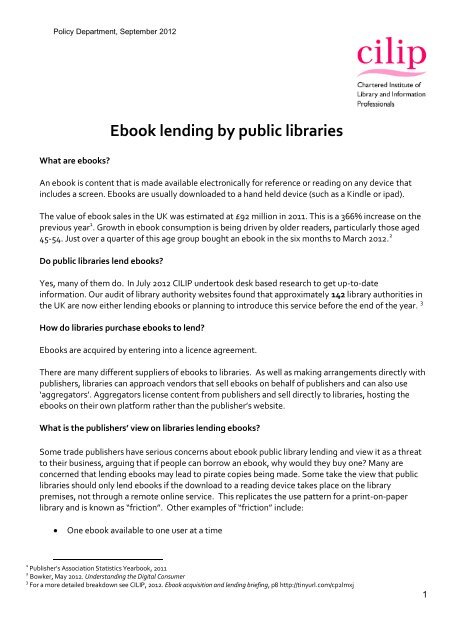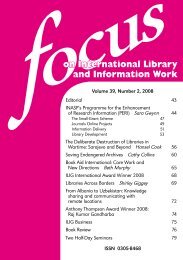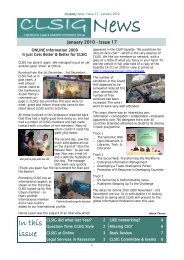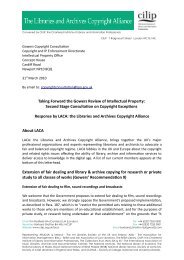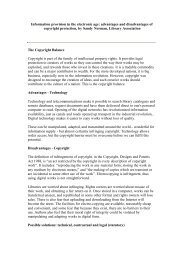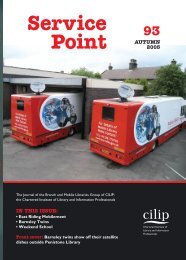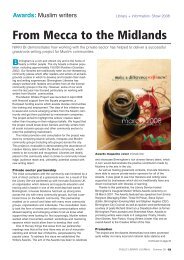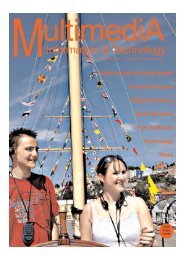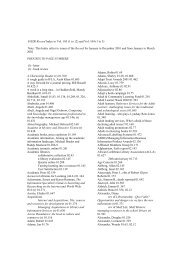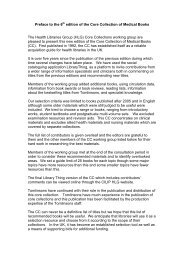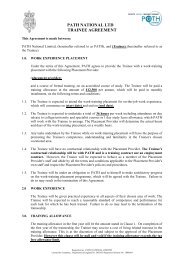Ebook lending by public libraries - CILIP
Ebook lending by public libraries - CILIP
Ebook lending by public libraries - CILIP
Create successful ePaper yourself
Turn your PDF publications into a flip-book with our unique Google optimized e-Paper software.
Policy Department, September 2012<br />
What are ebooks?<br />
<strong>Ebook</strong> <strong>lending</strong> <strong>by</strong> <strong>public</strong> <strong>libraries</strong><br />
An ebook is content that is made available electronically for reference or reading on any device that<br />
includes a screen. <strong>Ebook</strong>s are usually downloaded to a hand held device (such as a Kindle or ipad).<br />
The value of ebook sales in the UK was estimated at £92 million in 2011. This is a 366% increase on the<br />
previous year 1 . Growth in ebook consumption is being driven <strong>by</strong> older readers, particularly those aged<br />
45-54. Just over a quarter of this age group bought an ebook in the six months to March 2012. 2<br />
Do <strong>public</strong> <strong>libraries</strong> lend ebooks?<br />
Yes, many of them do. In July 2012 <strong>CILIP</strong> undertook desk based research to get up-to-date<br />
information. Our audit of library authority websites found that approximately 142 library authorities in<br />
the UK are now either <strong>lending</strong> ebooks or planning to introduce this service before the end of the year. 3<br />
How do <strong>libraries</strong> purchase ebooks to lend?<br />
<strong>Ebook</strong>s are acquired <strong>by</strong> entering into a licence agreement.<br />
There are many different suppliers of ebooks to <strong>libraries</strong>. As well as making arrangements directly with<br />
publishers, <strong>libraries</strong> can approach vendors that sell ebooks on behalf of publishers and can also use<br />
‘aggregators’. Aggregators license content from publishers and sell directly to <strong>libraries</strong>, hosting the<br />
ebooks on their own platform rather than the publisher’s website.<br />
What is the publishers’ view on <strong>libraries</strong> <strong>lending</strong> ebooks?<br />
Some trade publishers have serious concerns about ebook <strong>public</strong> library <strong>lending</strong> and view it as a threat<br />
to their business, arguing that if people can borrow an ebook, why would they buy one? Many are<br />
concerned that <strong>lending</strong> ebooks may lead to pirate copies being made. Some take the view that <strong>public</strong><br />
<strong>libraries</strong> should only lend ebooks if the download to a reading device takes place on the library<br />
premises, not through a remote online service. This replicates the use pattern for a print‐on‐paper<br />
library and is known as “friction”. Other examples of “friction” include:<br />
� One ebook available to one user at a time<br />
1 Publisher’s Association Statistics Yearbook, 2011<br />
2 Bowker, May 2012. Understanding the Digital Consumer<br />
3 For a more detailed breakdown see <strong>CILIP</strong>, 2012. <strong>Ebook</strong> acquisition and <strong>lending</strong> briefing, p8 http://tinyurl.com/cp2lmxj<br />
1
Policy Department, September 2012<br />
� One ebook can be issued a maximum of 26 times (equal to the number of loans before a print<br />
book is worn out)<br />
� Only for registered library users (living in the community or registered as students or teachers of<br />
a university)<br />
� Download to an ereading device, only on the library premises (i.e. no remote online service)<br />
� Holdback period after <strong>public</strong>ation<br />
What are the main issues and challenges facing <strong>public</strong> <strong>libraries</strong> and their users?<br />
� Implications for collection development, management and circulation<br />
A range of practices and policies that were under the exclusive control of the library are now a matter of<br />
negotiation with publishers and/or distributors. For the first time the ability to acquire commercially<br />
published books for library collections is constrained. The supplier decides what is in a subscription<br />
package. The result is that the library may not be able to present to its users the most popular titles or<br />
the most specialized literature on a subject.<br />
E<strong>lending</strong> is a service and therefore requires authorization <strong>by</strong> the rights holder. There is no<br />
unconditional <strong>lending</strong> right.<br />
The right to interlibrary loan an ebook requires both negotiated license conditions and a technical<br />
capability that many <strong>libraries</strong> do not have access to.<br />
Not all contracts offer perpetual access to ebooks. After a certain time, titles could be deleted from a<br />
database <strong>by</strong> the supplier.<br />
� Technical issues<br />
There is a diverse range of ebook platforms and standards in the market that are often not compatible,<br />
user friendly or accessible.<br />
You cannot borrow UK <strong>public</strong> library ebooks on a Kindle, the most popular ereader.<br />
� A national ebook <strong>lending</strong> service?<br />
Do we need over 200 <strong>public</strong> library authorities managing ebook acquisitions and <strong>lending</strong> or could it be<br />
done <strong>by</strong> national and regional consortia or even just one UK agency?<br />
.<br />
� Threat to the principle of free access to reading<br />
Charging for ebooks could be seen as starting to charge for core <strong>public</strong> library provision. Section 8.3 of<br />
the 1964 Public Libraries and Museums Act states that no authorisation shall be given for charges for<br />
the borrowing of written material providing "the material is lent in a form in which it is readable without<br />
the use of any electronic or other apparatus". Clearly this is not true for ebooks which do need a device<br />
to read them and therefore a charge can be made for them with no upper limit being stipulated in the<br />
Library Charges Regulations (1991). This brings into question the library’s role in ensuring freedom of<br />
access to information for all.<br />
2
Policy Department, September 2012<br />
� Competition from alternative providers<br />
Public <strong>libraries</strong> will be in competition with alternative providers such as Afictionado, who plan to launch<br />
a UK subscription “<strong>lending</strong>” (i.e. rental) service in 2012 4 . Amazon has already launched an e-book<br />
<strong>lending</strong> service for Kindle in the US, although it is working with <strong>libraries</strong>.<br />
� Public Lending Right<br />
Public Lending Right (PLR) is the right for authors to receive payment under PLR legislation for the<br />
loans of their books <strong>by</strong> <strong>public</strong> <strong>libraries</strong>. Section 43 of the Digital Economy Act 2010 extends PLR to<br />
audiobooks and ebooks “lent out” from <strong>public</strong> library premises (N.B. a physical visit to the library is<br />
required). This has not been implemented, however.<br />
� Alternative formats for the print disabled<br />
<strong>Ebook</strong>s offer the greatest potential to increase access to books <strong>by</strong> blind and partially sighted people.<br />
However, restrictions on re-formatting text can impede access. Logging in using screen readers and<br />
magnification software, and navigating online catalogues and selecting titles to download can also be<br />
difficult.<br />
� Value Added Tax (VAT)<br />
Printed books and journals are exempt from VAT, but electronic resources are not.<br />
Possible solutions<br />
� Evidence that library users also purchase ebooks<br />
Evidence that library ebook borrowers also buy ebooks could help to allay some of the publishers’<br />
concerns. The Pew Internet Report concluded that “the majority of readers of ebooks (61%) prefer to<br />
purchase their own copies rather than borrow them”. The study also contained data showing that<br />
<strong>libraries</strong> and librarians are a prominent source (21%) for owners of ereading devices to get<br />
recommendations for reading materials 5 .<br />
A 2011 study <strong>by</strong> Library Journal and Bowker PubTrack Consumer reports that 50% of all library users in<br />
the USA report purchasing books <strong>by</strong> an author they were introduced to in the library. 6<br />
Hampshire Libraries is taking part in a pilot with Overdrive that has set up online links to booksellers’<br />
websites.<br />
� Evidence about levels of piracy<br />
<strong>Ebook</strong> suppliers wrap their ebooks in robust digital rights management (DRM) software, meaning the<br />
file expires after the loan period. There is no evidence of library loaned items being stripped of DRM<br />
and loaded on file sharing websites. 7<br />
4<br />
Reported in The Bookseller, 14 September 2011 http://www.thebookseller.com/news/afictionado-plans-subscription-<strong>lending</strong>-service.html<br />
5<br />
The rise of e-reading, April 2012<br />
6<br />
http://www.publishersweekly.com/pw/<strong>by</strong>-topic/industry-news/publishing-and-marketing/article/49316-survey-says-library-users-are-your-<br />
best-customers.html<br />
3
Policy Department, September 2012<br />
� Licensing solutions 8<br />
In the present situation when <strong>libraries</strong> face many different licensing models there is a need to develop<br />
agreements with publishers’ organizations on standardized licensing terms, which would enable<br />
<strong>libraries</strong> to make available on reasonable and fair conditions to their users all works published in<br />
electronic formats chosen <strong>by</strong> the library. EBLIDA is exploring the idea of a Memorandum of<br />
Understanding with the Federation of European Publishers on Fair Licensing Models (see below).<br />
� Accessible ebooks<br />
The RNIB’s recent leaflet "Can everyone read your books?" links to guidance for <strong>libraries</strong>, publishers<br />
and booksellers and highlights accessible ebooks: http://tinyurl.com/cdl4d8u<br />
Next steps<br />
� On September 26 th 2012 Culture Minister Ed Vaizey announced an independent review of ebook<br />
<strong>lending</strong> in England. For more information see:<br />
http://www.culture.gov.uk/news/media_releases/9365.aspx<br />
� The Society of Chief Librarians E-Book Group, which has over 100 <strong>public</strong> library authority members,<br />
is involved in discussions with publishers about how to develop an ebook marketplace that works<br />
for all stakeholders.<br />
� EBLIDA is launching an ebook campaign (http://www-legacy.eblida.org/index.php?page=e-bookscampaign)<br />
. The campaign suggests:<br />
o an updating of the copyright regime for ebooks, e-<strong>lending</strong> and e-content in order to enable<br />
<strong>libraries</strong> to continue to perform their services for all European citizens<br />
o a Memorandum of Understanding with the Federation of European Publishers on Fair<br />
Licensing Models as part of their “ebooks campaign”<br />
� In November 2011 The World Intellectual Property Organization (WIPO) Standing Committee on<br />
Copyright and Related Rights (SCCR) began formal deliberations on a Treaty Proposal on<br />
Limitations and Exceptions for Libraries and Archives (TLIB). A number of TLIB clauses if<br />
incorporated in an international WIPO treaty have the potential to influence ebook licence<br />
agreements. See: http://www.ifla.org/en/copyright-tlib<br />
� The American Library Association is currently negotiating with individual publishers in an effort to<br />
convince them to provide affordable e-books to <strong>libraries</strong>.<br />
Further information<br />
A longer briefing, setting out more of the legal, strategic and technical problems that arise from the<br />
addition of both scholarly and trade ebooks to <strong>public</strong> and academic and research library collections,<br />
together with possible solutions, is available on the <strong>CILIP</strong> website at http://tinyurl.com/cp2lmxj<br />
7<br />
Taken from Edwards, S., and Leech, H., 2012. Library e-book <strong>lending</strong> fears – myth or reality? I http://www.goscl.com/scl-position-on-e-<strong>lending</strong>in-<strong>libraries</strong>/library-e-book-downloading-socauth/<br />
[accessed 20 September 2012]<br />
8<br />
Taken from von Hielmcrone, H, 2012. IFLA E-Lending Background Paper http://www.ifla.org/files/clm/<strong>public</strong>ations/ifla-background-paper-e-<br />
<strong>lending</strong>-en.pdf [accessed 25 August 2012]<br />
4


